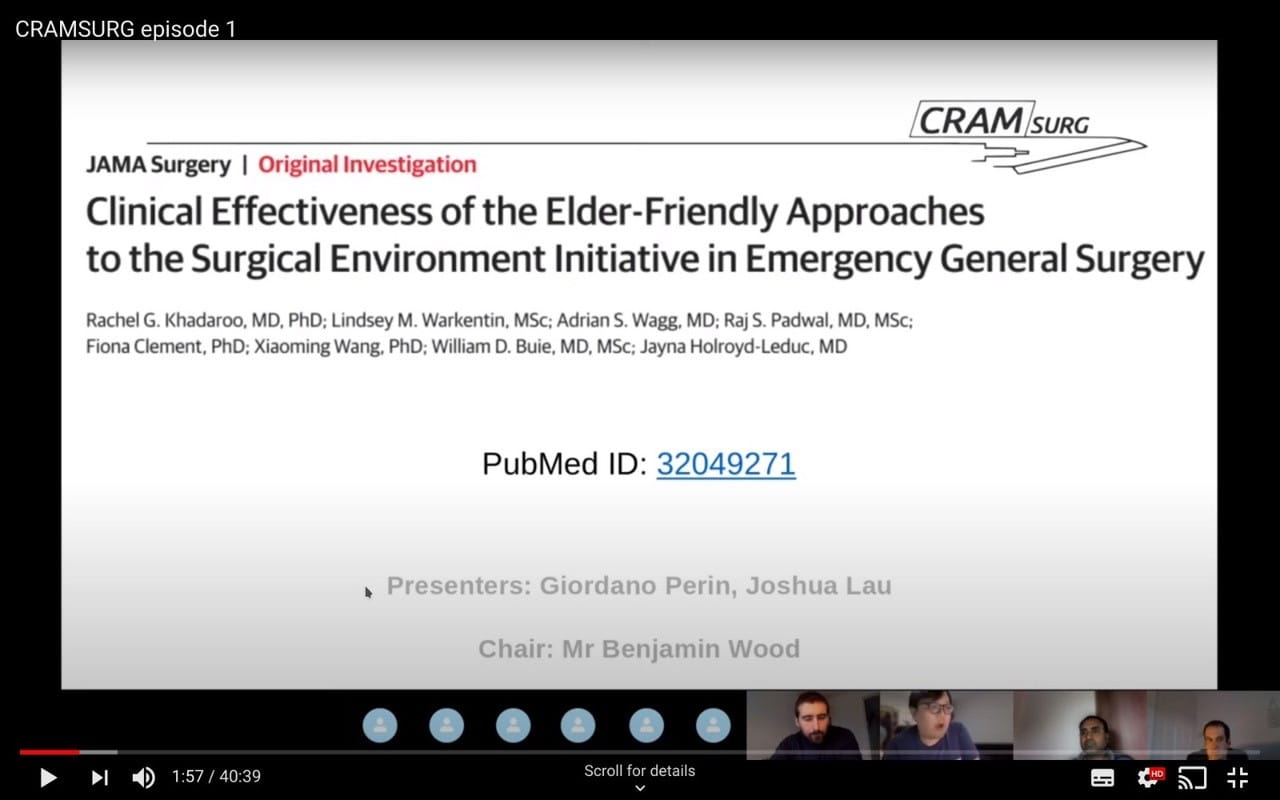Setting up an e-journal club during the COVID-19 pandemic: the CRAMsurg experience
25 Aug 2020
Joshua Lau, Gio Perin, Benjamin Wood, Adam Hague, Sabapathy Balasubramanian
In this blog series, Joshua Lau, Gio Perin, Benjamin Wood and Adam Hague, all trainees in the Yorkshire and the Humber region, along with Sabapathy Balasubramanian, a consultant endocrine surgeon at Sheffield Teaching Hospitals, discuss how organising an online journal club has maximised learning opportunities throughout the pandemic.
The COVID-19 pandemic affected surgeons and surgical trainees in a variety of ways: redeployment to A&E and acute medical wards, a reduction in both elective and emergency procedures, and a shift to remote clinics and multidisciplinary team meetings. Furthermore, COVID-19 had a significant impact on training, operating theatres and educational activities. In this context, and with an aim to facilitate the continuation of teaching, we set up an
e-journal club.
Our club
This project commenced during the peak of the pandemic under the guidance of a consultant, Sabapathy Balasubramanian, and alongside surgical trainees from registrar to Core Surgical Trainee level. Our aim was to equip trainees in the Yorkshire and Humber Deanery with the knowledge of research methodology and develop their ability to critically appraise research papers. We set up a format in accordance with a typical journal club. However, our meetings take place on the internet, where participants are safe at home with no concerns around infectivity. We started by meeting online on Thursdays at around 8:10pm (to embrace ‘clap for carers’ at 8pm). Typically, two trainees present and critique a recent (off the press) surgical manuscript for up to 20 minutes. A 10-minute Q&A session follows and this is moderated by a third trainee. Subsequently, a tutorial on a topic of research methodology is conducted (by Professor Balasubramanian) followed by another 10-minute Q&A session.
Maximising teaching opportunities using modern technology
Online video-conferencing platforms, such as Skype and Google Hangouts, provide an invaluable opportunity for safe delivery of teaching without concerns about airborne infection and need for social distancing or personal protective equipment (PPE). Our presenters stay at home where they are (presumably) more relaxed (but we did hear a few children crying every now and again!). The platform also allowed for the recording of sessions (with trainees’ consent), which are then uploaded to YouTube, Spotify, iTunes and Google Podcasts. This allows trainees to catch up if they miss a meeting, listen to discussions on the go and revisit discussions as required to revise or refresh their knowledge. We have also built a website where all the resources are easily accessible. The online model allows for widening participation for trainees across the deanery. Feedback from participants can be obtained via Google Forms; data from which is stored in a Google Spreadsheet and used to auto-generate attendance certificates. These can be set up with minimal time and effort, and significantly reduce administrative work.
At the time of writing this blog entry, CRAMsurg had successfully conducted nine sessions with an average number of fifteen participants. We also had 162 YouTube views and 39 podcast starts. We have received mostly positive feedback (our average live session satisfaction rating is 4.8/5). The journal club is at its infancy but we believe that it does have great potential to deliver surgical teaching both efficiently and informatively.
The problems that we face
Starting a journal club is probably the easy part, the challenge is running and sustaining the club. The inclusion of a large number of trainees and high participation levels, regardless of location, may make the e-journal club more sustainable. Several issues we encountered are similar to that of a traditional journal club: surgeons’ and trainees’ availability limited by their work schedules and social needs. Planning schedules well in advance and choosing times more reflective of trainee needs may address the issue of availability. Unlike other traditional journal clubs where advertising is mostly within a specific department, the e-journal club aims to involve and engage trainees from across the region. Our main channel of promotion is through social media platforms such as WhatsApp, Facebook, Instagram and Twitter.
To increase sustainability, enhance engagement, promote learning of research methodology and principles of appraisal, we recruited some medical students to volunteer to assist in managing the club activities such as editing video and audio footage of the presentations and discussions, and managing our social media accounts. In return, they receive teachings on critical appraisal and research methodology as well as boosting their own portfolios for a potential career in academia.
The future
In the future, we are hoping to build on our current platform to incorporate additional forms of teaching into the club structure. These include building an online e-learning platform with pre-prepared training modules on methodology and appraisal related to surgical research.
In conclusion, 2020 has been a challenging year for surgical trainees with limited opportunities. However, with the aid of freely available online tools, CRAMsurg has demonstrated one way in which teaching can be delivered through the internet safely and effectively.
'With an aim to facilitate the continuation of teaching, we set up an e-journal club.'
This blog is from our series COVID-19: views from the NHS frontline. If you would like to write a blog for us, please contact content@rcseng.ac.uk.

